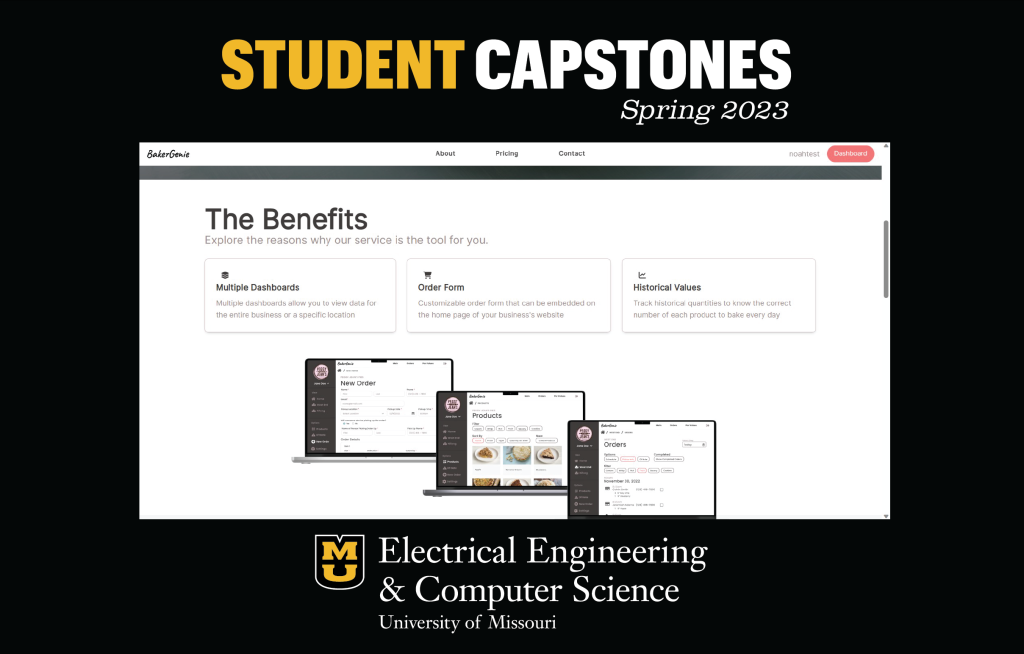May 23, 2023

Computer science students in the capstone group Pecan π Shop created a web application for bakery owners to manage all aspects of their businesses.
The project was one of many that CS students worked on for their capstone course, a class that connects student groups with industry partners to solve a real-world problem. The goal is to give students professional experience before they enter the workforce.
Pecan π Shop included students Noah Free, Maria Lusardi, Jack Stepanek and Devin Hackman. Free and Lusardi explained more about the project and what they learned from the experience.
What was the problem your group wanted to solve?
Lusardi: The problem came to us from the owner of a local Columbia bakery. He was having to spend much of his time on the logistics of running the bakery, such as making the baking schedule, tracking product on the shelves, organizing order pickups, etc. He currently uses several different web and desktop applications to do this. However, it would be far more convenient to have a single web-application as a one-stop-shop. There are currently products like that on the market for restaurants, but nothing tailored to the unique needs of a small-business bakery, where products are made on-demand and expire quickly.
What were the results?
Lusardi: Though we were initially unsure how much our four-person team could accomplish in only a semester, we managed to get a near-fully-functional deployment ready product. Our web application provides a user-friendly interface for creating order forms, organizing products, creating and tracking orders, scheduling when things need to be baked, emailing reminders and much more.
Additionally, companies with multiple locations can maintain separate dashboards for each location and give employees access on their own accounts. Currently, the application is planned to work as a subscription service, with a certain base cost per month and an additional cost per month per location.
What did you learn during the project?
Lusardi: Noah, our team lead, was the only person with extensive prior web development experience from internships. The rest of us had to catch up to speed, but it turned into an incredibly useful learning experience. We worked with the Remix framework to handle front and back end, Tailwind CSS for styling, Vitest for our unit testing, and MongoDB as our database. These are all common technologies the industry is using right now, so it was great to have a project that gave us good hands-on experience.
How did you Mizzou Engineering education prepare you for the capstone?
Free: Mizzou Engineering provided me with a solid foundation in computer science and web development, which was crucial in preparing me for this Capstone project. I relied heavily on the concepts taught in the web development courses that Mizzou offers. These classes equipped me with a deep understanding of web development principles, languages, and frameworks, which proved invaluable in designing and implementing this project.
Additionally, my internship last summer, which counted as three credit hours towards my computer science degree, provided me with real-world experience in web engineering and further boosted my readiness to produce a high-quality product in Capstone. As soon as we decided what our project was going to be, I knew that using the knowledge and tools gained over the past few years at Mizzou my groupmates and I were going to be able to make a really neat application that would have the potential to greatly enhance the lives of small-business bakery owners.
Lusardi: Professor Gary McKenzie’s capstone class and mentorship were great throughout the project. Capstone is by far the largest project any of us have had the chance to work on in college, but Professor McKenzie was great at breaking a daunting task down into manageable pieces and encouraging us to take this on.
Thanks for sharing!
Learn more about the computer science program at Mizzou and apply today!